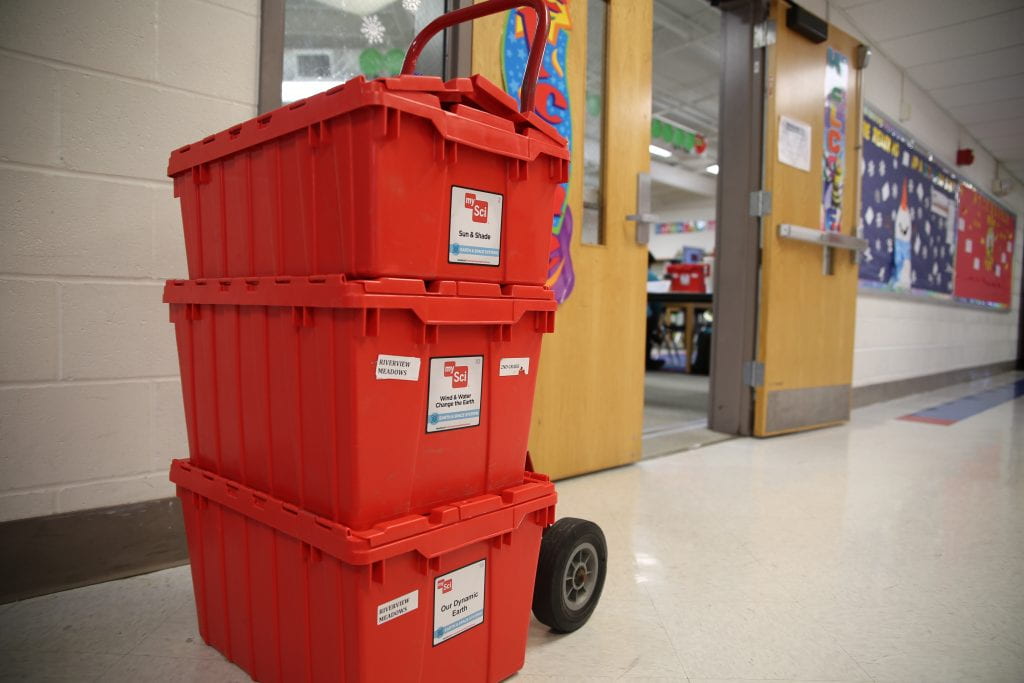Twelve years after its launch, the innovative mySci curriculum program developed by Washington University’s Institute for School Partnership (ISP) and local teacher leaders is seeing incredible growth, doubling in size two years in a row.
This school year, St. Louis Public Schools will introduce mySci in all of its 45 elementary schools. The district joins 150 public, charter, parochial and independent schools across the region that have adopted the innovative, hands-on curriculum. In total, mySci serves approximately 60,000elementary and middle-school students.
“We are transforming science education in the St. Louis region,” said Rachel Ruggirello, ISP associate director. “mySci proves that doing science — not just talking about it or reading about it — is key to student success.”
Supported by a Monsanto Fund grant, mySci launched in 2005 and provides hands-on lessons, effective teacher development and assessment tools. mySci educators teach elementary teachers key scientific concepts and how to activate small-group learning. Classrooms receive mySci kits — big red boxes neatly packed with everything a teacher needs, from books to batteries to light bulbs. Pre-tests and post-tests help schools better understand student needs and predict performance on standardized testing.
“Two years ago, we were delivering 1,500 mySci kits and consumables, and this year we’ll deliver over 9,000 kits and consumables,” Ruggirello said.
Keith May, operations and materials manager, added “we doubled last year over the previous year and we’re going to double again this year.”
Based on the successful elementary program, mySci received additional funding to expand and develop a middle school (6-8) program that integrates elements of engineering, mathematics and technology. That curriculum was finalized this summer and has been adopted by school districts for use this academic year.
What makes mySci unique, according to Ruggirello, is its collaborative nature.
“We sit down with the individual schools and districts and work with them to customize a plan that will make an impact on student achievement. Our goal is to support teachers and STEM teaching and learning. It’s not only about the kits and curriculum. It’s the entire package,” she said.
Additionally, educators like the fact that mySci is local and developed with teachers for teachers. This past summer, like many summers prior, the mySci Resource Center teemed with two dozen teachers, busy writing and editing curriculum. During the mySci development period, over 145 local teachers were involved in writing and editing units and making revisions. Many more were involved in piloting the curriculum..
“We collect feedback and data throughout the year and modify and redesign the curriculum,” Ruggirello said. “We take the teacher ideas and directly incorporate them into the curriculum.”
And recent data from the Pattonville School District confirms that mySci boost student success. Elementary students in the district– at every grade level and of every ability – made statistically significant gains in science after completing the innovative curriculum.
As a former teacher, ISP curriculum coordinator Jeanne Norris knows firsthand the need for quality, comprehensive curriculum.
“It’s a challenge to find lessons that do everything you need them to do as well as follow all of the state education standards,” Norris said. “mySci does that!”
Norris is a member of the EQuIP Peer Review Panel for Science – a national panel commissioned to identify high-quality lessons and units that are designed for the Next Generation Science Standards (NGSS). She brings insight gained during those panel sessions back to the mySci program.
“During panel sessions, I make a mental checklist of how mySci is faring,” Norris said. “Do we connect instruction to the students’ home and community? Check. Do we provide differentiated instruction? Check. Do we embed formative assessment processes throughout the curriculum? Check. It’s good to know we are an effective resource for our region.”
Looking ahead to the future, Ruggirello wants to build a network of mySci teachers who will serve as ambassadors in their own districts and partners to teachers in other schools.
“We want kindergarten teachers in Jennings to network with kindergarten teachers in Mehlville,” Ruggirello said. “We want them to learn from each other and build onto the program to make it even better.”
August 2017 | by, Myra Lopez
